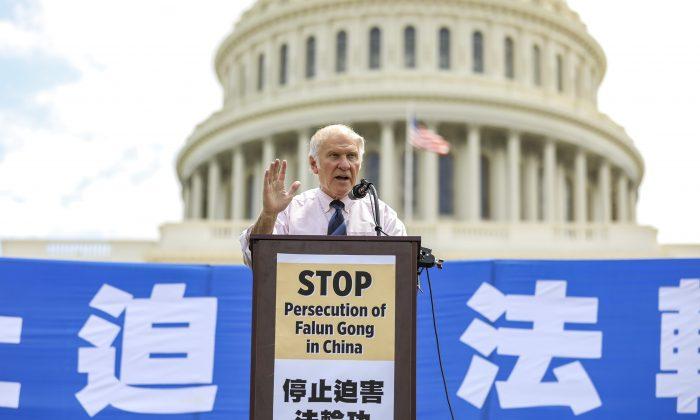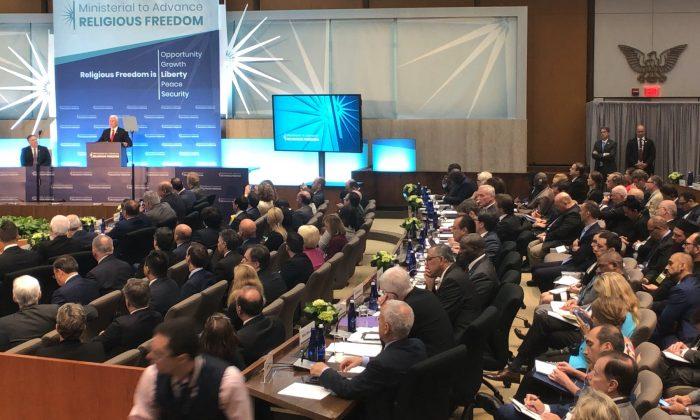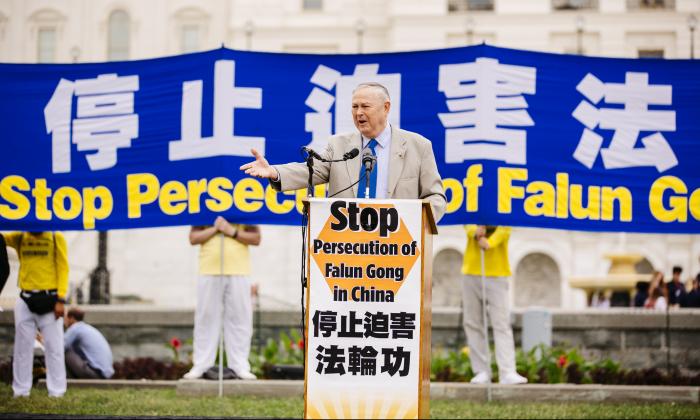WASHINGTON—The debate is heating up in Washington on the intentions of the Islamic Republic of Iran. One side says it is well on its way to building nuclear weapons and the other side says Iran’s leaders haven’t made that decision.
The International Atomic Energy Agency (IAEA) team was not permitted access to a key military site, during two days of talks with Iranian officials on Feb. 20 and 21. This meeting was a follow-up of previous discussions held at the end of January. The senior IAEA team also failed to reach an agreement on the unresolved issue of Iran’s nuclear program, pertaining to “possible military dimensions,” IAEA said.
“It is disappointing that Iran did not accept our request to visit Parchin during the first or second meetings,” IAEA Director General Yukiya Amano said. “We engaged in a constructive spirit, but no agreement was reached,” in an IAEA press release.
The Parchin military site is suspected of being used for high-explosive testing for developing a ballistic missile that could trigger a nuclear weapon, according to Bloomberg and AFP.
The IAEA said in its November 2011 report that it regularly receives information regarding Iran’s nuclear related activities that involve military organizations. The November report also stated that IAEA had proof of “the acquisition of nuclear weapons development information and documentation from a clandestine nuclear supply network.”
These two points and other evidence indicate the desire to develop a nuclear explosion device, says the IAEA. Iran has not provided proof that its nuclear program is intended only for peaceful purposes, IAEA says.
Meanwhile Iran has been increasing its enrichment of uranium to 20 percent. It says it needs this level for a reactor making medical isotopes for cancer patients. Iran increased its supply of 20 percent-enriched uranium to almost 240 pounds from just over 162 pounds reported in November, according to Bloomberg, citing the IAEA. A grade of 90 percent is needed for a nuclear bomb, but 20 percent is a very significant step towards reaching that goal, according to experts.
“What has raised the world’s suspicions is that Iran continues to produce 20 percent enriched uranium despite the fact that this exceeds its civilian needs,” says Foreign Policy (FP), Feb. 28.
FP says that Iran can take its 20 percent enriched uranium and turn it into weapons-grade material in a month’s time.
Secretary of Defense Leon Panetta said on CBS’s Face the Nation, Jan. 8, “We know that they’re trying to develop a nuclear capability. And that’s what concerns us. And our red line to Iran is, do not develop a nuclear weapon. That’s a red line for us.”
Iran’s enrichment program is in violation of U.N. Security Council resolutions, according to Tommy Vietor, spokesman for the U.S. National Security Council, reported Bloomberg.
Sanctions
“How close is Iran to a nuclear bomb?” asked Bob Schieffer, chief Washington correspondent for CBS News, at a Center for Strategic and International Studies (CSIS)-Schieffer Dialogue Series, Feb. 23.
“I don’t know,” replied Admiral William J. Fallon, USN (Ret.), former commander, U.S. Central Command. Fallon said the Iranians are intentionally keeping their aims ambiguous.
David Sanger, chief Washington correspondent for The New York Times, responded to Schieffer’s question with, “Having the capacity or near capacity is perhaps more useful to them than actually having a weapon.” They likely wouldn’t use the weapon because they know what would happen to them if they did. They want to reap the benefits of becoming a dominant influence in the region by being just short of making a weapon.
General James E. Cartwright, USMC (Ret.), former vice chairman of the Joint Chiefs of Staff, also on the panel, said we have to consider carefully our options. The United States has taken a diplomatic approach, seeking a diplomatic solution when dealing with Iran’s nuclear ambitions.
“The clock is ticking,” Gen. Cartwright said. We have stated that we will not tolerate Iran making a nuclear bomb, but we said the same thing about North Korea.
Gen. Cartwright said the United States or Israel could strike their facilities. But we have had 10 years of war and the country is war weary. A strike would probably also involve an invasion and regime change in Iran, and so a strike is not likely, he said.
The sanctions of the last six months have been effective, according to most observers and may have been the reason for Iran’s willingness to come back to the negotiating table. Sanger said that these sanctions “have got their attention. … This is the first time we are directly going after their oil revenue.” Their currency has fallen by half, he noted.
Can sanctions alone convince Iran’s leaders that the nuclear program is not worth it? Different opinions are offered. President Barack Obama said the Iranian “regime is more isolated than ever before,” and the leaders are faced with “crippling sanctions.” But their nuclear program is popular at home, even among the opposition parties.
Sanger said that five of their scientists have been assassinated, widely believed the work of Israel’s intelligence. Their missile plants have blown up, and it’s not clear whether these were spontaneous accidents. Does the above make them “redouble their determination or does it make them think it is not worth it?” he asks.
Strike or Not to Strike?
President Obama in the Jan. 24 State of the Union address reiterated the red line that Defense Secretary Leon Panetta had uttered earlier and his willingness to use military force:
“America is determined to prevent Iran from getting a nuclear weapon, and I will take no options off the table to achieve that goal.”
Closing the Strait of Hormuz, which Iran has threatened to do, is a red line, Panetta said. As one fifth of the world’s oil passes through the Strait, it could be a significant disruption. Chairman of the Joint Chiefs of Staff Gen. Martin Dempsey told Schieffer that the Iranians could close the Strait of Hormuz, but not for long.
But it may be hard to determine when the red line is crossed with regard to building a nuclear weapon.
Both James R. Clapper Jr., the Pentagon’s top intelligence official, who has been director of national intelligence since 2010, and Gen. Dempsey have independently stated recently that it is their opinion that the Iranian regime has not as yet decided to make a nuclear weapon.
“They are keeping themselves in a position to make that decision,” said Clapper to Sen. Lindsey Graham (R-S.C.), Feb. 16.
Gen. Dempsey said on CNN that Israel striking Iran’s nuclear sites could delay the capability to achieve a nuclear bomb for a couple of years, but the U.S. position is that it is not prudent at this time.
However, there are neoconservatives who reject the sanctions approach and the logic of containing Iran. They believe Iran’s intentions are to make a bomb and that a preemptive U.S. or Israeli strike is the correct course. Two prominent neoconservatives who have voiced this view are John Bolton, former Bush administration official and current Mitt Romney adviser, and Elliott Abrams, who served in the Reagan and George W. Bush administrations and is currently at the Council on Foreign Relations.
Abrams mocked the whole concept of Iran’s peaceful nuclear program, dubbing it, Iran’s “peaceful annihilation program.” He wrote Feb. 22 that the wife of an Iranian nuclear scientist killed in Tehran in January told the press that “[her husband]’s ultimate goal was the annihilation of Israel.” The scientist “worked at the enrichment facility at Natanz, a key part of Iran’s ‘peaceful’ nuclear program.”



